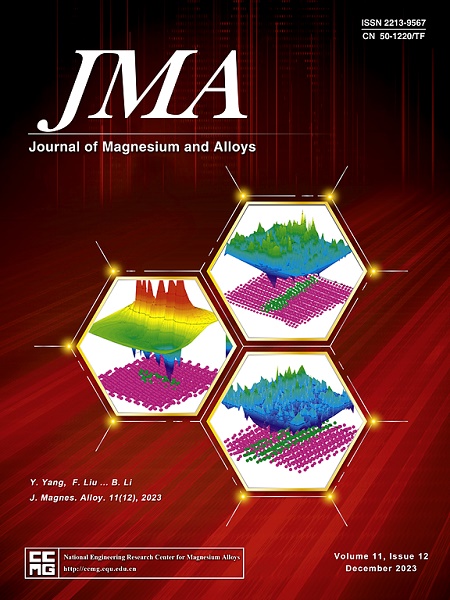液态CO2冷却双面搅拌摩擦加工超细生物镁合金的强度-塑性及断裂行为研究
IF 15.8
1区 材料科学
Q1 METALLURGY & METALLURGICAL ENGINEERING
引用次数: 0
摘要
生物镁(Mg)合金具有良好的生物相容性和生物降解性,在植入物应用中具有很大的前景。然而,它们有限的强度-延性平衡仍然是限制其广泛使用的关键挑战。在本研究中,采用液体CO₂快速冷却的双面摩擦搅拌工艺(DS-FSP)制备了超细晶均质镁合金,显著提高了搅拌区的强度-塑性协同效应。结果表明,DS-FSP试样的抗拉强度(UTS)和伸长率同时提高,分别达到334.1±15 MPa和28.2±7.3%。与单面搅拌摩擦处理获得的非均匀细晶组织相比,DS-FSP产生了均匀的超细晶组织,从根本上改变了镁合金的断裂行为和断裂机制。由于不同颗粒间基底滑移系统激活的差异,DS-FSP样品呈现不规则的断裂模式。相比之下,单面搅拌摩擦处理样品具有细晶但不均匀的微观结构,表现为扁平剪切断裂,主要是由孪晶形成引起的高密度位错引发,断裂扩展由非均匀织构决定。通过实现超细晶粒尺寸和均匀织构,DS-FSP有效地改变了生物镁合金的断裂机制,从而提高了生物镁合金的强度-塑性平衡。本文章由计算机程序翻译,如有差异,请以英文原文为准。

Research on strength-ductility and fracture behavior of ultra-fine bio-magnesium alloys via double-sided friction stir processing using liquid CO2 cooling
Bio-magnesium (Mg) alloys exhibit excellent biocompatibility and biodegradability, making them highly promising for implant applications. However, their limited strength-ductility balance remains a critical challenge restricting widespread use. In this study, ultra-fine-grained and homogeneous Mg alloys were fabricated using double-sided friction stir processing (DS-FSP) with liquid CO₂ rapid cooling, leading to a significant enhancement in the strength-ductility synergy of the stirred zone. The results demonstrate that DS-FSP samples exhibit simultaneous improvements in ultimate tensile strength (UTS) and elongation, reaching 334.1 ± 15 MPa and 28.2 ± 7.3 %, respectively. Compared to the non-uniform fine-grained microstructure obtained through single-sided friction stir processing, DS-FSP generates a uniform ultra-fine-grained structure, fundamentally altering the fracture behavior and mechanisms of Mg alloys. The DS-FSP samples exhibit irregular fracture patterns due to variations in basal slip system activation among different grains. In contrast, single-sided friction stir processing samples, characterized by a fine-grained yet heterogeneous microstructure, display flat shear fractures dominated by high-density dislocation initiation induced by twin formation, with fracture propagation dictated by the non-uniform texture. By achieving an ultra-fine grain size and homogeneous texture, DS-FSP effectively modifies the fracture mechanisms, thereby enhancing the strength-ductility balance of bio-magnesium alloys.
求助全文
通过发布文献求助,成功后即可免费获取论文全文。
去求助
来源期刊

Journal of Magnesium and Alloys
Engineering-Mechanics of Materials
CiteScore
20.20
自引率
14.80%
发文量
52
审稿时长
59 days
期刊介绍:
The Journal of Magnesium and Alloys serves as a global platform for both theoretical and experimental studies in magnesium science and engineering. It welcomes submissions investigating various scientific and engineering factors impacting the metallurgy, processing, microstructure, properties, and applications of magnesium and alloys. The journal covers all aspects of magnesium and alloy research, including raw materials, alloy casting, extrusion and deformation, corrosion and surface treatment, joining and machining, simulation and modeling, microstructure evolution and mechanical properties, new alloy development, magnesium-based composites, bio-materials and energy materials, applications, and recycling.
 求助内容:
求助内容: 应助结果提醒方式:
应助结果提醒方式:


